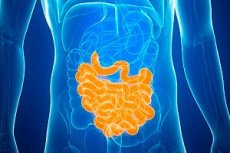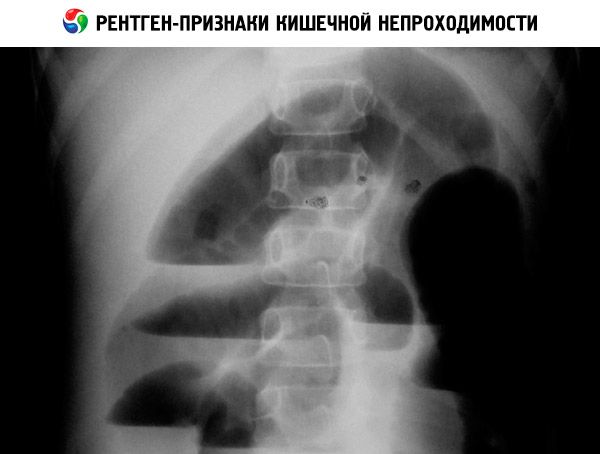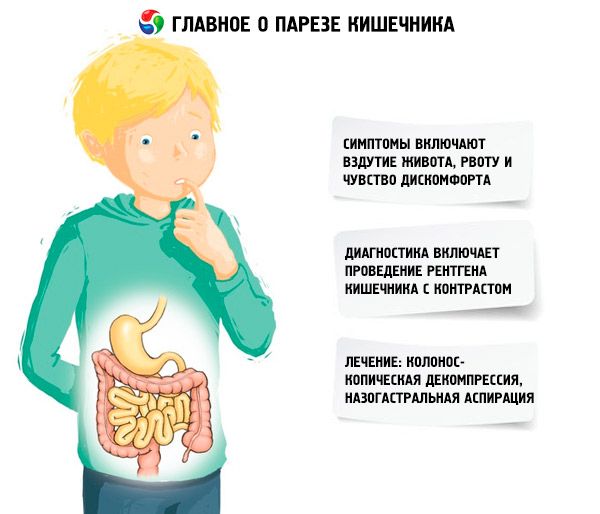Medical expert of the article
New publications
Intestinal paresis (ileus)
Last reviewed: 12.07.2025

All iLive content is medically reviewed or fact checked to ensure as much factual accuracy as possible.
We have strict sourcing guidelines and only link to reputable media sites, academic research institutions and, whenever possible, medically peer reviewed studies. Note that the numbers in parentheses ([1], [2], etc.) are clickable links to these studies.
If you feel that any of our content is inaccurate, out-of-date, or otherwise questionable, please select it and press Ctrl + Enter.

Intestinal paresis (paralytic intestinal obstruction, adynamic intestinal obstruction, ileus) is a temporary disturbance of intestinal peristalsis.
This disorder is commonly seen after abdominal surgery, especially bowel surgery. Symptoms of intestinal paresis include nausea, vomiting, and vague abdominal discomfort. Diagnosis of intestinal paresis is based on radiographic findings and clinical examination. Treatment of intestinal paresis is favorable and includes nasogastric intubation, aspiration, and intravenous fluid therapy.
Causes intestinal paresis
In addition to postoperative causes, ileus may result from intra-abdominal or retroperitoneal inflammatory processes (eg, appendicitis, diverticulitis, perforated duodenal ulcer), retroperitoneal or intra-abdominal hematomas (eg, ruptured abdominal aortic aneurysm, vertebral compression fracture), metabolic disorders (eg, hypokalemia), or drug effects (eg, opiates, anticholinergics, sometimes Ca channel blockers).
Intestinal paresis (ileus) sometimes develops with diseases of the kidneys or chest organs (e.g., rib fractures below the VI-VII rib, lower lobe pneumonia, myocardial infarction).
Disturbances in gastric and colonic motility are common after abdominal surgery. Small intestinal function is usually the least affected; its motility and absorption return to normal within a few hours after surgery. The evacuation function of the stomach is usually impaired for approximately 24 hours or more; colonic function suffers the most and its recovery may be delayed for 48-72 hours or more.
Symptoms intestinal paresis
Symptoms of intestinal paresis include abdominal distension, vomiting, and a feeling of vague discomfort. Pain is rarely of the classic colicky nature as with mechanical obstruction. Stool retention or passage of small amounts of watery stool may be observed.
On auscultation, peristalsis is absent or minimal intestinal sounds are heard. The abdomen is not tense unless the underlying cause is of inflammatory etiology.
Where does it hurt?
Diagnostics intestinal paresis
The most important task is to differentiate ileus from intestinal obstruction. In both cases, radiographs show gas accumulation in distended individual intestinal loops.
However, in postoperative obstruction, gas may accumulate to a greater extent in the colon than in the small intestine. Gas accumulation in the small intestine in the postoperative period may indicate the development of complications (e.g., obstruction, peritonitis).

In other types of intestinal obstruction, radiographic findings are similar to obstructive obstruction; differential diagnosis of intestinal paresis may be difficult if clinical findings do not clearly indicate one or another type of intestinal obstruction.
Radiographic studies with water-soluble contrast media may aid in differential diagnosis.
What do need to examine?
How to examine?
Who to contact?
Treatment intestinal paresis
Treatment of intestinal paresis involves continuous nasogastric aspiration, complete exclusion of oral food and liquid intake, intravenous transfusion of fluids and electrolytes, minimal use of sedatives, and exclusion of the use of opiates and anticholinergic drugs.
Maintaining an adequate serum K level [>4 mEq/L (>4 mmol/L)] is particularly important. Persistent ileus for more than 1 week most likely has a mechanical obstructive cause, and laparotomy should be considered.

Occasionally, colonic ileus can be relieved by colonoscopic decompression; rarely, cecostomy is necessary.
Colonoscopic decompression is sometimes effective in treating pseudo-obstruction (Ogilvie's syndrome), which is due to a natural bowel curvature at the splenic flexure, although no cause for gas and stool retention is found on barium enema or colonoscopy.


 [
[